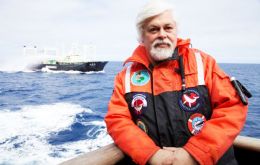MercoPress. South Atlantic News Agency
Tag: Paul Watson
-
Wednesday, December 18th 2024 - 07:44 UTC
Denmark releases anti-whaling activist Paul Watson; pledges to continue battling Japan’s illegal operations

The Canadian-American anti-whaling activist Paul Watson was released from a Greenland jail after a five-month detention, where he was detained on an international arrest warrant by Interpol on request from the Japanese government.
-
Tuesday, July 23rd 2024 - 06:38 UTC
Whale environmentalist and crew arrested in Greenland on Japanese warrant

The Greenland police reported it had arrested environmental activist Paul Watson when his ship docked in Nuuk under an international warrant issued by Japan. The 73-year-old Canadian-American citizen has been known for engaging in direct action tactics such as confrontations with whaling ships out at sea.
-
Thursday, December 27th 2018 - 04:22 UTC
Sea Shepherd celebrates Japan will cease whaling around Antarctica

Marine conservationists Sea Shepherd are claiming Japan's decision to abandon whaling around Antarctica as a victory, though their battle will go on with the Asian nation moving to resume hunting elsewhere. On Boxing Day, Japan announced it was leaving the International Whaling Commission so it could resume commercial hunting of the marine mammals in their territorial waters.
-
Wednesday, August 30th 2017 - 08:07 UTC
Anti-whaling group Sea Shepherd admits defeat: “we can't match Japan's military surveillance technology”

The anti-whaling group Sea Shepherd has announced it will not intercept Japanese vessels in the Southern Ocean this season. The group's ships have confronted Japanese vessels off Antarctica each year since 2005.
-
Wednesday, December 19th 2012 - 20:12 UTC
US court tells Sea Shepherd to stay away from Japan’s whaling fleet in Southern Ocean

US court has ordered conservation group Sea Shepherd to stay at least 500 yards away from Japan's whaling fleet in the Southern Ocean. The US Court of Appeals for the Ninth Circuit banned the group from “physically attacking any vessel engaged by the plaintiffs”.
-
Thursday, July 26th 2012 - 18:38 UTC
Sea Shepherd leader Watson skips bail fearing extradition to Japan

Sea Shepherd leader Paul Watson has skipped bail and fled from Germany, with his supporters claiming they fear he would have been extradited to Japan over Antarctic whaling protests.
-
Thursday, October 6th 2011 - 18:04 UTC
Dangerous skirmishes anticipated when Japan begins Antarctica whaling season

New Zealand joined Australia in criticizing Japan’s decision to resume whaling in Antarctic waters later this year and Tokyo's announcement that it will increase security for its whaling fleet.
